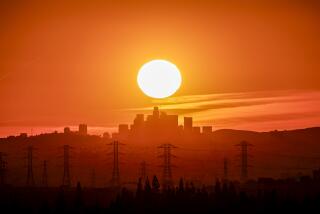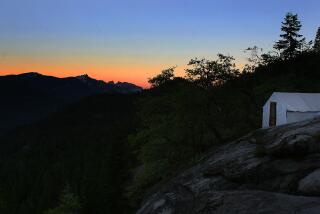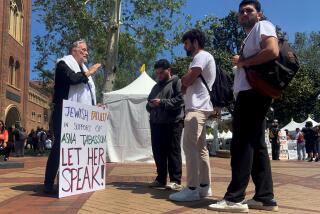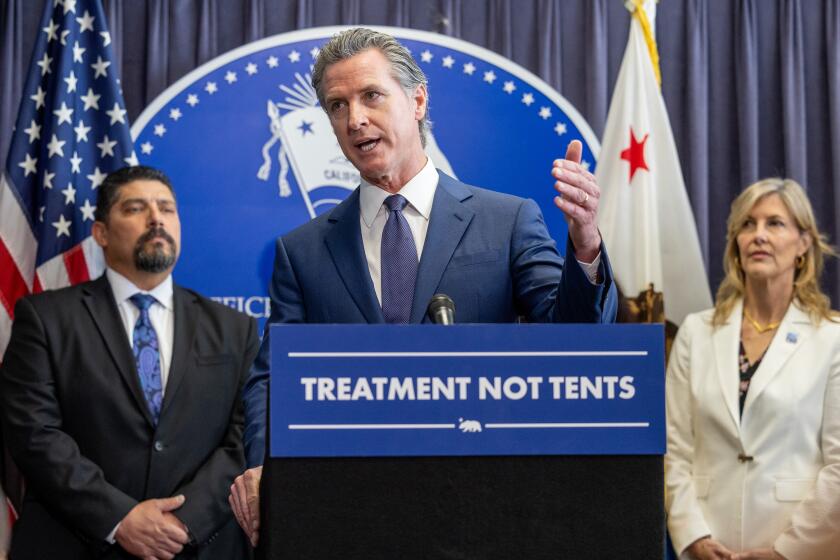In Black L.A., Reaction Is Strong but Complex
To Beverly Newton, the fatal police shooting of a 13-year-old black boy Sunday was a travesty.
“That kid shouldn’t have been out at 4 in the morning,” said Newton, 51, an African American from Windsor Hills. “But if a white teenager was out joyriding at any time of night, he would have just been ticketed.”
Yet when Newton asked her husband, a retired Los Angeles police officer, what he would have done in the same situation -- chasing a stolen car, only to have it crash, then back up toward his cruiser -- he told her frankly, “I don’t know.”
In black Los Angeles this week, there was immediate outrage over the slaying of Devin Brown, the eighth-grade car-theft suspect who was shot while backing a car toward an LAPD cruiser, according to police. But in some quarters, the response was more complicated.
In offices, shops, cafes and living rooms, African Americans replayed the facts and argued over the appropriateness of the police response. Some viewed the incident through the prism of their own experiences with aggressive policing. Others, such as Melanie Elaine, a hairstylist, saw in it a moral about lax parental supervision.
“I think [the officers] were protecting themselves,” said Elaine, 40, who works at the Salon Eberechi on West Slauson Avenue. “They didn’t expect a 13-year-old to be behind the wheel. Secondly, where was his mother?”
Many who disagreed about one officer’s response concurred about the police in general: Distrust still pollutes the relationship between blacks and the Los Angeles Police Department, nearly 13 years after riots sparked by the televised police beating of Rodney King.
A Times poll released last week shows that the LAPD enjoys its best approval rating in years: 68% of all registered voters. But among blacks, only 40% approve of the LAPD. That perception gap is the widest measured in more than a decade of polling on the question.
Exacerbating the tensions were recent developments in two other high-profile cases of police violence.
On Feb. 3, prosecutors declined to file charges against an LAPD officer who repeatedly beat a black auto-theft suspect, Stanley Miller, with a flashlight. And in January, two Inglewood police officers involved in the videotaped beating of black teenager Donovan Jackson won a $2.4-million jury award for wrongful termination.
“With all the things that happened up to now, it’s like they’re almost pushing for a riot,” said Brian Polk, a lending officer at a Century Boulevard mortgage company. “We got three separate incidents right now. If they let this cop off who shot this 13-year-old, I don’t know what’s going to happen.”
Early on, the tension was evident on the streets.
Scores gathered Tuesday at South Western Avenue and 83rd Street, where the shooting occurred, before marching to Bethel AME Church about three blocks away.
“Be prepared to die!” screamed a small group of protesters led by a man with a sign that read, “Death to Pigs.” “Be prepared to kill!”
But a couple of women shouted back: “Be prepared to live!”
At the church, community leaders and preachers unanimously counseled against making the same destructive decisions as in 1992. They received supportive applause from a packed audience.
James Harris, chairman of the Southwest Neighborhood Council, hinted at plans for an economic boycott that would force city leaders to alter their police policies.
“We have to turn the fire way up,” he said. “And I’m not talking about burning down where we live.”
Half a block away, Kevin Ferguson was working in the stockroom of a corner market, which was busy with locals getting off work and protesters looking for snacks. Ferguson led a stranger to the stockroom to give his take on the incident.
Yes, he said, the LAPD needed to be held accountable for what appeared to be a questionable use of force. But he also wondered how Devin Brown ended up in that situation Sunday morning.
“We don’t deserve the treatment we get, but I also think we shouldn’t put ourselves in a position where we do get treated that way,” Ferguson said. “But I have a 13-year-old at home, and guess what? He’s going to stay home.”
Police said Devin ran a red light then failed to stop when police tried to pull him over for allegedly weaving between lanes in a Toyota Camry they later found was reported stolen. After a brief chase, the car ran up on a curb and stopped. Officer Steve Garcia, a nine-year LAPD veteran, got out of his cruiser, then fired 10 shots into the Camry when it backed toward his vehicle, officials said. It is unclear where Garcia was standing when he fired the shots.
Ferguson had already given his views to a local TV station and said his friends had been giving him grief for it all day long.
As he spoke, a young woman appeared at the doorway. “I just wanted to say hi to the TV star,” she said, beaming.
“What? You’re not mad at me too?” Ferguson said.
The reactions extended beyond African Americans. Later that night, a young Latino man from the neighborhood walked over to a shrine by the shooting site and scrawled a note to the officer on a piece of poster board.
“Garcia,” he wrote in Spanish. “Will you be able to sleep? Tomorrow? The next week?”
The man, a college counselor, said he would have given LAPD officers an “F” grade for their conduct in the neighborhood -- even before the shooting. “There’s no human relations,” he said. “There’s no people skills. Once they put on those uniforms, they become part of a gang. And the irony is, we pay for their jobs.”
The sentiment was radically different five miles away at the Gourmet Grill in Ladera Heights, where real estate agent Bryan Kessee, 40, had joined a pair of old friends, brothers Stephen and Stafford Hamlin, for a lunch of Portobello mushroom and chicken sandwiches.
The area, wedged between Culver City and Inglewood, is one of the wealthiest black neighborhoods in the country. The lunch trio were unanimous in their opinion about Sunday’s shooting. “I think he shouldn’t have never stole the car,” Kessee said. “I think they ought to stop stealing cars. If something happens, that’s life.”
Kessee appeared to be exaggerating for laughs, and the brothers chuckled. They basically agreed with him. But they also said that blacks were treated differently from whites in Los Angeles, especially by the police.
“If you’re not doing anything wrong, you’re going to be OK in L.A.,” Stephen Hamlin said. “But if you screw up, you’re going to get the riot act read to you. You’re going to get laid out.”
Stafford Hamlin added: “Black people just don’t get the benefit of the doubt, and white people do.”
All three men grew up in Los Angeles, graduating from Crenshaw High School together in 1982. Stafford Hamlin became a recreation coordinator, and Stephen Hamlin is a salesman. They say police profiling is not as overt as it once was, but they all say they make sure to behave carefully around police and to teach their children that justice works differently for blacks.
Kessee wondered whether the police biases have changed over the years to be more accepting of blacks in wealthy neighborhoods such as Ladera Heights, but tougher in poorer neighborhoods such as 83rd and Western.
If Devin had been pulled over in Ladera Heights, Kessee said, “he would probably have been given the benefit of the doubt.”
Next door, in the well-appointed offices of Deloy Edwards Realtors, agent Dola Duplessis disagreed wholeheartedly.
“This is horrible,” she said, quietly and calmly. “Here is a kid only 13 years old. They said he stole a car, but did it warrant them killing him?”
Duplessis had heard of the LAPD’s February shooting of a white robbery victim in Santa Monica, after he backed his car toward a police cruiser. But as she saw it, most incidents like the Devin Brown shooting happened disproportionately in black neighborhoods.
“And I think the fact that the kid was a young black male means there will be no repercussions for the officer,” she said. “Look at what happened in Inglewood -- they got money. And we could see what they did on national TV.”
By Wednesday evening, the street scene near 83rd and Western had mellowed. A small crowd continued to gather near the candles and signs set out for Devin, and a few motorists honked as they passed. A handmade sign read, “Baby Killer LAPD.” But the shouting appeared to have stopped.
A few blocks to the north, DeAndre Sanders was serving up banana splits through the window of Gwen’s Double Dip, a beloved neighborhood ice cream parlor.
When Sanders was asked his opinion on the shooting, however, his words were as cold as the product. “There really ain’t no solution,” he said. “Unless they come up with a solution that will make police less afraid of committing terrorist acts.”
More to Read
Start your day right
Sign up for Essential California for news, features and recommendations from the L.A. Times and beyond in your inbox six days a week.
You may occasionally receive promotional content from the Los Angeles Times.






